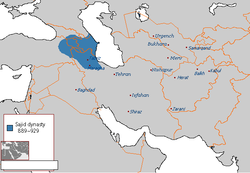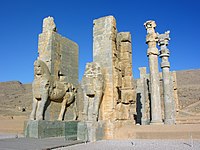Sajid dynasty
Sajid dynasty ساجیان | |||||||||
|---|---|---|---|---|---|---|---|---|---|
| 889–929 | |||||||||
 Map of the Sajid dynasty at its greatest extent | |||||||||
| Capital | Maragha (889-901) Ardabil (901-929) | ||||||||
| Common languages | Persian | ||||||||
| Religion | Sunni Islam | ||||||||
| Government | Monarchy | ||||||||
| Afshin | |||||||||
• 889–901 | Muhammad ibn Abi'l-Saj | ||||||||
• 928–929 | Abu'l-Musafir al-Fath (last) | ||||||||
| Historical era | Middle Ages | ||||||||
• Established | 889 | ||||||||
• Disestablished | 929 | ||||||||
| |||||||||
| Today part of | |||||||||
| History of Iran |
|---|
 |
|
Timeline |
The Sajid dynasty (Persian: ساجیان), was an Islamic dynasty that ruled from 889-890 until 929. Sajids ruled Azerbaijan and parts Armenia first from Maragha and Barda and then from Ardabil.[1] The Sajids originated from the Central Asian province of Ushrusana and were of Iranian (Sogdians)[2][3][4] descent. Muhammad ibn Abi'l-Saj Diwdad the son of Diwdad, the first Sajid ruler of Azerbaijan, was appointed as its ruler in 889 or 890. Muhammad's father Abi'l-Saj Devdad had fought under the Ushrusanan prince Afshin Khaydar during the latter's final campaign against the rebel Babak Khorramdin in Azerbaijan, and later served the caliphs. Toward the end of the 9th century, as the central authority of the Abbasid Caliphate weakened, Muhammad was able to form a virtually independent state. Much of the Sajids' energies were spent in attempting to take control of neighboring Armenia. The dynasty ended with the death of Abu'l-Musafir al-Fath in 929.
Chronology
- Abdu Ubaydullah Muhammad Ibn Abi'l-Saj (899-901)
- Abul Musafir Devdad Ibn Muhammad (901)
- Yusuf Ibn Abi'l-Saj (901-919)
- Subuk (919-922) (a servant of the Sajids and a temporary care-taker)
- Yusuf (restored) (922-928)
- Fath b. Muhammad b. Abi 'l Saj (928-929)
See also
References
- ^ Iranicaonline.org AZERBAIJAN iv. Islamic History to 1941
- ^ Clifford Edmund Bosworth, The New Islamic Dynasties: A Chronological and Genealogical Manual, Columbia University, 1996. pg 147: "The Sajids were a line of caliphal governors in north-western persia, the family of a commander in the 'Abbasid service of Soghdian descent which became culturally Arabised."
- ^ V. Minorsky, Studies in Caucasian history, Cambridge University Press, 1957. pg 111
- ^ C. E. Bosworth, "AZERBAIJAN iv. Islamic History to 1941" in Encyclopaedia Iranica. [1](accessed November 2010). Quote: "In ca. 279/892 the caliph Moʿtażed appointed one of his generals, Moḥammad b. Abi’l-Sāj, an Iranian from Central Asia, as governor of Azerbaijan and Armenia, and the family of the Sajids "
Literature
- Madelung, Wilferd. "Minor Dynasties of Northern Iran." The Cambridge History of Iran, Volume 4: The Period From the Arab Invasion to the Saljuqs. Ed. R. N. Frye. New York, New York: Cambridge University Press, 1975.
- Clifford Edmund Bosworth, The New Islamic Dynasties: A Chronological and Genealogical Manual, Columbia University, 1996.
- V. Minorsky, Studies in Caucasian history, Cambridge University Press, 1957.
- Sajid dynasty
- Muslim dynasties
- Medieval Azerbaijan
- Medieval Iranian Azerbaijan
- Medieval Armenia
- Medieval Georgia (country)
- Former monarchies of Asia
- 9th century in Asia
- 10th century in Asia
- 880s establishments in Asia
- 10th-century disestablishments in Asia
- 9th century in Europe
- 10th century in Europe
- Former countries in Europe
- 929 disestablishments
